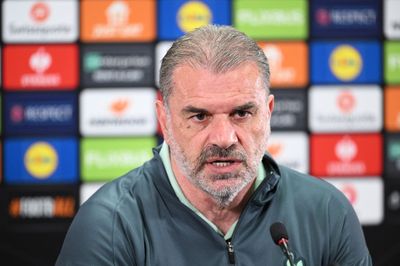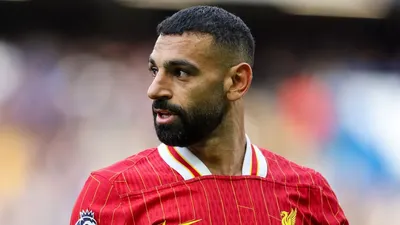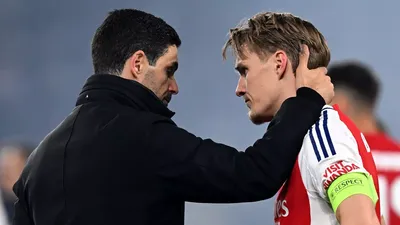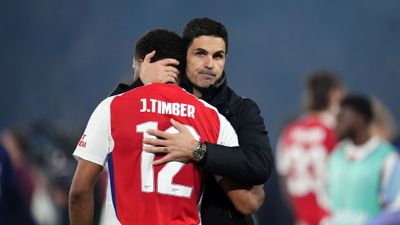Quick Betimate
Popular Leagues
-
UEFA Nations League
-
England (40)
- FA Cup (1)
- Premier League (10)
- Championship (4)
- League 1 (2)
- League 2 (2)
- National League (2)
- National League North (1)
- National League South (1)
- EFL Trophy
- Premier League 2 (2)
- Championship Women
- Derbyshire Senior Cup
- Development League 2 (1)
- FA Cup Women (1)
- FA Trophy (1)
- Isthmian Cup
- Isthmian Division One North
- Isthmian Division One South
- Isthmian Premier Division
- National League Cup
- Northern League Division One
- Northern Premier League
- Reserve Matches
- Southern Premier League Central
- Southern Premier League South
- Super League Women (6)
- U21 Premier League Cup
- Northern Ireland Championship (1)
- Northern Ireland Championship Women
- Northern Ireland Cup
- Northern Ireland Intermediate Cup
- Northern Ireland League Cup Women
- Northern Ireland Play-Offs (1)
- Northern Ireland Premier
- Northern Ireland Premier Intermediate League
- Northern Ireland Premier League Women (4)
- Northern Ireland Reserve League
- Scotland Regional Cup
- Wales League Cup Women
-
UEFA Champions League
-
UEFA Europa League (2)
-
Spain (213)
- La Liga (10)
- Segunda (11)
- Tercera Group 1 (9)
- Tercera Group 2 (9)
- Tercera Group 3 (9)
- Tercera Group 4 (9)
- Tercera Group 5 (9)
- Tercera Group 6 (9)
- Tercera Group 7 (9)
- Tercera Group 8 (9)
- Tercera Group 9 (9)
- Tercera Group 10 (9)
- Tercera Group 11 (9)
- Tercera Group 12 (9)
- Tercera Group 13 (9)
- Tercera Group 14 (9)
- Tercera Group 15 (9)
- Tercera Group 16 (9)
- Tercera Group 17 (9)
- Tercera Group 18 (9)
- Youth League
- Copa del Rey
- Kings League - 40 mins play
- Primera Division RFEF Group 1 (10)
- Primera Division RFEF Group 2 (10)
- Primera Federacion Women
- Primera Women (8)
- Queens League - 40 mins play (2)
- Regional Cup
- Regional League
- Segunda Division RFEF Group 1
- Segunda Division RFEF Group 2
- Segunda Division RFEF Group 3
- Segunda Division RFEF Group 4
- Segunda Division RFEF Group 5
- Segunda Federacion Women
- Tercera Federacion Women
-
USA (614)
-
Germany (232)
- Bundesliga I (9)
- Bundesliga II (9)
- DFB Pokal (1)
- Regionalliga Bayern (9)
- Regionalliga North (9)
- Regionalliga North East (9)
- Regionalliga South West (9)
- Regionalliga West (8)
- Oberliga Baden-Wuerttemberg (9)
- Oberliga Bayern North (9)
- Oberliga Bayern South (8)
- Oberliga Bremen (8)
- Oberliga Hamburg (9)
- Oberliga Hessen (10)
- Oberliga Mittelrhein (8)
- Oberliga Niederrhein (9)
- Oberliga Niedersachsen (9)
- Oberliga NOFV Nord (8)
- Oberliga NOFV Sud (8)
- Oberliga Rheinland-Pfalz/Saar (9)
- Oberliga Schleswig-Holstein (8)
- Oberliga Westfalen (9)
- 3. Liga (10)
- Bundesliga II Play-Offs
- Bundesliga II Women (7)
- Bundesliga Play-Offs
- Bundesliga U19 (24)
- Bundesliga Women (6)
- DFB Pokal Women
- Regionalliga Play-Offs
- U19 Cup (1)
-
Italy (68)
- Serie A (10)
- Serie B (10)
- Serie C Group A
- Serie C Group B
- Serie C Group C
- Campionato Nazionale
- Campionato Primavera 1 (10)
- Campionato Primavera 2 (16)
- Serie D (5)
- Coppa Italia (1)
- Coppa Italia Women (1)
- Campionato Primavera 3
- Campionato Primavera 4
- Primavera Cup
- Serie A Women (4)
- Serie B Play-Offs
- Serie B Women
- Serie C Cup
- Serie C Play-Offs (9)
- Serie C Super Cup (2)
- U19 League Women
-
France (55)
-
Netherlands (40)
-
Scotland (20)
-
Australia A-League (2)
-
Japan J-League (10)
-
Japan J2-League (10)
-
Indonesia Liga 1 (9)
-
Cyprus Division 1 (4)
-
Israel Premier League (7)
-
Colombia Primera A (1)
-
Colombia Primera B (10)
-
Esport (246)
Other Leagues
-
Albania (1)
-
Algeria (30)
-
Andorra (8)
-
Angola (8)
-
Argentina (89)
-
Armenia (8)
-
Aruba
-
Australia (157)
- A-League (2)
- A-League Women (2)
- Capital Territory NPL2 (4)
- Capital Territory NPL2 U23 League
- Capital Territory Premier League (4)
- Capital Territory Premier League Women
- Capital Territory Premier League Women Reserves
- Capital Territory U23 League
- Darwin Premier League
- FFA Cup Qualifying (2)
- New South Wales League 1 (8)
- New South Wales League 2 (7)
- New South Wales NPL Women (1)
- New South Wales NPL2 Women
- New South Wales Premier League (8)
- New South Wales U20 League (5)
- Northern NSW Division 1 (5)
- Northern NSW Premier League (6)
- Northern NSW Premier League Women
- Northern NSW Reserves League (6)
- NPL Queensland (6)
- NPL Queensland U23
- NPL Queensland Women (5)
- NPL Victoria (7)
- NPL Victoria U23
- NPL Victoria Women (6)
- NSW League 1 U20
- NSW League 2 U20
- Queensland PL 2 U23
- Queensland PL U23 (6)
- Queensland Premier League (6)
- Queensland Premier League 2 (1)
- Queensland Premier League 2 Women
- Queensland Premier League 3
- Queensland Premier League 4
- Queensland Premier League Women (4)
- SA Premier League Reserves (5)
- SA Premier League Women (5)
- SA Premier League Women Reserves (2)
- South Australia Premier League (6)
- South Australia State League 1 (6)
- South Australia State League Reserves
- Sunday League Premier Division
- Sunday League Premier Division Reserve
- Tasmania Championship (4)
- Tasmania Championship Women
- Tasmania NPL U21 League
- Tasmania Premier League (4)
- Tasmania South Division 1
- Tasmania Super League Women
- Victoria PL 1 U23
- Victoria Premier League 1 (7)
- Victoria Premier League 2
- Victoria State League 1 (1)
- Victoria State League 1 Reserves
- Victoria State League 2
- Victoria State League 2 Reserves
- WA Premier League Women (4)
- WA Premier League Women U21
- WA State League 1 Reserves
- WA State League Reserves Cup
- Western Australia Premier League (6)
- Western Australia State League 1 (6)
- Western Australia State League 1 Women
- Western Australia State League 2
- Western Australia U23 League
- Australian Matches
-
Austria (47)
-
Azerbaijan (7)
-
Bahrain (6)
-
Bangladesh (7)
-
Barbados
-
Belarus (18)
-
Belgium (17)
-
Belize
-
Benin
-
Bhutan
-
Bolivia (16)
-
Bosnia & Herzegovina (14)
-
Botswana (8)
-
Brazil (208)
- Serie A (10)
- Serie B (10)
- Serie C (10)
- Campeonato Amapaense (2)
- Campeonato Baiano 2 (5)
- Campeonato Brasileiro A2 Women (9)
- Campeonato Brasileiro Serie B U20 (8)
- Campeonato Carioca A2 (6)
- Campeonato Cearense B
- Campeonato Goiano 2 (4)
- Campeonato Maranhense
- Campeonato Mineiro 2 (6)
- Campeonato Mineiro U20 (6)
- Campeonato Paranaense 2 (5)
- Campeonato Paulista A3
- Campeonato Paulista A4
- Campeonato Paulista U20 (24)
- Campeonato Rondoniense
- Campeonato U20 Women
- Copa Rio Women
- Copa Verde
- Matches (5)
- Matches Women
- Paraense (1)
- Paulista Serie B
- Paulista Women (1)
- Serie A U20 (1)
- Serie A1 Women (8)
- Serie A2 Women
- Serie A3 Women (14)
- Serie D (33)
- U20 Cup
- U20 League (24)
- U20 Women Cup
- Copa do Brasil (16)
- Women’s Friendly
-
Bulgaria (12)
-
Burkina Faso
-
Burundi
-
Cambodia (4)
-
Cameroon (8)
-
Canada (3)
-
Chile (46)
-
China (45)
-
Colombia (19)
-
Costa Rica
-
Côte d’Ivoire (8)
-
Croatia (21)
-
Cuba
-
Cyprus (4)
-
Czech Republic (100)
-
Denmark (52)
-
Djibouti
-
Dominica
-
Dominican Republic
-
Ecuador (10)
-
Egypt (19)
-
El Salvador (4)
-
Estonia (21)
-
Ethiopia (3)
-
Faroe Islands (12)
-
Fiji
-
Finland (136)
-
Gambia (3)
-
Georgia (7)
-
Ghana (11)
-
Gibraltar
-
Greece (15)
-
Guatemala (4)
-
Haiti
-
Honduras (3)
-
Hong Kong SAR China (11)
-
Hungary (22)
-
Iceland (54)
-
India (2)
-
Indonesia (9)
-
Iran (19)
-
Iraq (4)
-
Ireland (23)
- Republic of Ireland FAI Cup (7)
- Republic of Ireland FAI Intermediate Cup
- Republic of Ireland First Division (5)
- Republic of Ireland Leinster Senior Cup
- Republic of Ireland Leinster Senior League
- Republic of Ireland Munster Senior League
- Republic of Ireland National League Women (6)
- Republic of Ireland Premier Division (5)
- Republic of Ireland U20 League
-
Israel (19)
-
Jamaica (2)
-
Japan (48)
-
Jordan (2)
-
Kazakhstan (18)
-
Kenya (8)
-
Kuwait (5)
-
Kyrgyzstan
-
Latvia (12)
-
Lebanon (2)
-
Liechtenstein (1)
-
Lithuania (21)
-
Luxembourg (18)
-
Macau SAR China
-
Macedonia (15)
-
Malawi (11)
-
Malaysia (1)
-
Mali
-
Malta (3)
-
Mauritania (2)
-
Mexico (15)
-
Moldova (8)
-
Mongolia
-
Montenegro (9)
-
Morocco (16)
-
Mozambique
-
Myanmar (Burma) (3)
-
Namibia
-
Nepal (2)
-
New Zealand (16)
-
Nicaragua (3)
-
Niger (1)
-
Nigeria (10)
-
Norway (93)
- Eliteserien (8)
- Division 1 (8)
- Cup (2)
- Cup Women (3)
- Division 1 Play-Offs
- Division 1 Women (6)
- Division 2 Group 1 (7)
- Division 2 Group 2 (7)
- Division 2 Group 3
- Division 3 Group 1 (7)
- Division 3 Group 2 (7)
- Division 3 Group 3 (7)
- Division 3 Group 4 (7)
- Division 3 Group 5 (7)
- Division 3 Group 6 (7)
- Interkretsserie U19 (5)
- Toppserien Women (5)
- U19 Elite League
- Youth Cup
-
Oman (6)
-
Panama (6)
-
Paraguay (20)
-
Peru (22)
-
Philippines
-
Poland (78)
-
Portugal (37)
-
Puerto Rico
-
Qatar (7)
-
Romania (64)
-
Russia (59)
-
Rwanda (1)
-
Saint Kitts and Nevis
-
San Marino (1)
-
Saudi Arabia (26)
-
Senegal (3)
-
Serbia (16)
-
Seychelles
-
Sierra Leone
-
Singapore (7)
-
Slovakia (33)
-
Slovenia (8)
-
Solomon Islands
-
South Africa (10)
-
South Korea (32)
-
Suriname
-
Sweden (96)
- Europe Friendlies
- Allsvenskan Qualification
- Superettan Qualification
- 1.div Norra (8)
- Cup (1)
- 1.div Södra (8)
- 2.div Norra Götaland (7)
- 2.div Norra Svealand (7)
- 2.div Norrland (6)
- 2.div Södra Götaland (7)
- 2.div Södra Svealand (7)
- 2.div Västra Götaland (7)
- Allsvenskan (8)
- Cup Women (1)
- Damallsvenskan (7)
- Elitettan (7)
- Juniorallsvenskan (7)
- Superettan (8)
-
Switzerland (23)
-
Taiwan
-
Tajikistan
-
Tanzania (3)
-
Thailand (4)
-
Togo (2)
-
Trinidad and Tobago (6)
-
Tunisia (26)
-
Turkey (38)
- 2.Lig Play-Offs
- Türkiye 1 Lig (10)
- Türkiye 2 Lig Beyaz
- Türkiye 2 Lig Kirmizi
- Türkiye 2.Lig Play-offs (5)
- Türkiye 3. Lig Promotion Group Play-off (2)
- Türkiye 3.Lig Group 1 (1)
- Türkiye 3.Lig Group 2
- Türkiye 3.Lig Group 3
- Türkiye 3.Lig Group 4 (1)
- Türkiye Cup (1)
- Türkiye Super Lig (9)
- Türkiye U19 League (9)
- Türkiye Womens League
-
Uganda (3)
-
Ukraine (25)
-
United Arab Emirates (15)
-
Uruguay (4)
-
Uzbekistan (13)
-
Venezuela (4)
-
Vietnam (18)
-
Wales (1)
-
Zambia (9)
-
Zimbabwe (9)
Valencia stadium: A new home ground is still in progress

What was the first home ground of Valencia?
In the first four years from the inception of the club, Valencia played at a small stadium called Algiros in their city. In 1923, they moved to Mestalla and are still playing there after almost 100 years.
Mestalla is also known as one of the oldest football stadiums in Spain. Originally, it was a 17,000-capacity stadium, but after several times being restructured, now Mestalla holds 48,600 spectators, including 49,500 seats.
The Mestalla field was opened on May 20, 1923, with a friendly match between Valencia and Levante UD. Valencia's ground saw the most significant transformation in its history throughout the 1950s. The project resulted in a stadium with a seating capacity of 45,500 people, which was later destroyed by a flood in October 1957 caused by the Turia River overflowing. Nonetheless, the Mestalla was not only restored to its former glory, but it also received some further enhancements, like artificial lighting, which was introduced during the 1959 Fallas festivities.
Nottingham Forest was the first foreign side to play in the Mestalla in the 1960s, on September 15, 1961. Back in 1925, Mestalla hosted the Spanish national football team for the first time. When Spain hosted the 1982 FIFA World Cup and the 1992 Summer Olympics in Barcelona, it was designated as the national team's group venue. Up to the final, all of Spain's matches were staged in Mestalla, where they won gold.
Mestalla has hosted major international matches, as well as many Cup finals, and served as the home of Levante. Due to stadium construction, the pitch also served as a temporary home for Castellón and Real Madrid for European games.
The stadium was renamed Estadio Luis Casanova in 1969, in honor of club president Luis Casanova Giner. The name change lasted for a quarter-century until Casanova acknowledged that such an honor had overwhelmed him and requested in 1994 that the stadium's name be changed back to Mestalla.
The club's headquarters, positioned in the back of the numbered terraces, opened in 1972. It consisted of an avant-garde office with a trophy hall that housed the club's original flag. Another alteration at Mestalla came in the summer of 1973, with the insertion of goal seats, which marked the end of fourteen rows of standing room terraces.
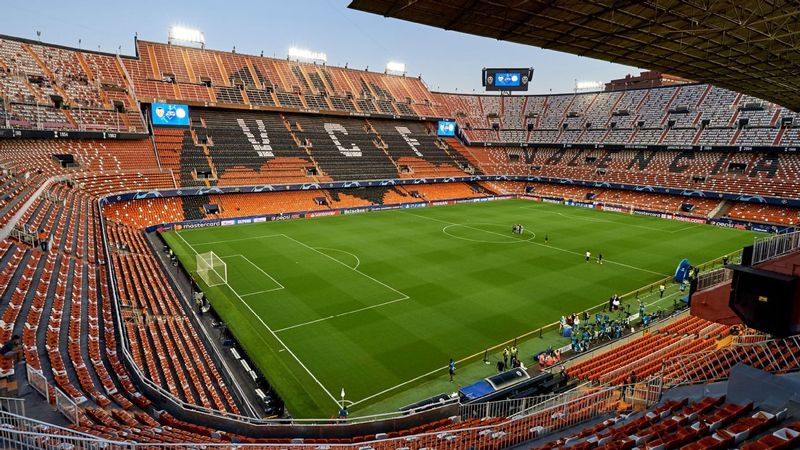
Mestalla stadium
The plan for a new stadium
The designs for the new stadium were introduced on November 10, 2006, at the Museu Principe Felipe in Valencia, by former president Juan Soler and the club, who revealed specifics about the stadium and showed a short film about it. The planned capacity was about 80,000 people. Nou Mestalla began construction in August 2007. It was supposed to be finished in early summer 2009, in time for the 2009–10 season, but owing to financial difficulties, it never happened. The club stated on December 12, 2011, that it had reached an agreement with Bankia to construct the stadium and transfer the old Mestalla site to the bank, and that it planned to finish the stadium in two years, however, the arrangement fell through.
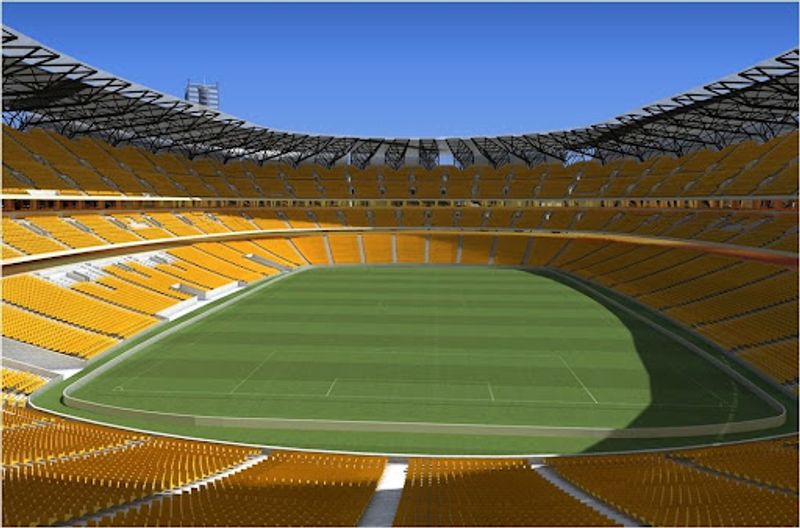
Design of Nou Mestalla
Valencia revealed a revised redesign by Fenwick Iribarren Architects on November 13, 2013. The capacity was lowered to 61,500 with the new design. It also decreased the original design's complete roof and ornate façade, as well as the subterranean parking garage. There were additional changes to the interior design. There was no indication of when building might resume. The structure, however, has not been updated since then.
Valencia stated on October 3rd, 2017 that they would restart discussions with Valencia's municipal council to revive the project and complete the Nou Mestalla construction process. In comparison to the original and updated plans, the venue will lose 20,000 seats. As a result, when it opens, it might have a capacity of 54,000 seats, making it the seventh-largest stadium in Spain instead of the third-largest as initially expected.
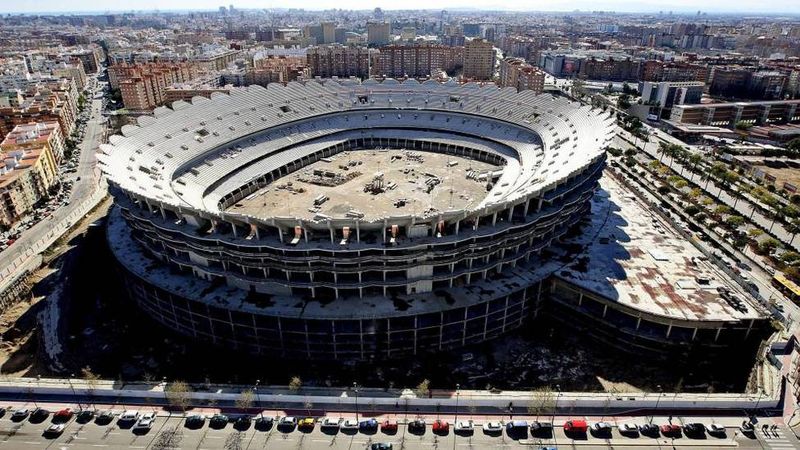
Nou Mestalla in progress
Some facts about Valencia
Origin
Valencia, or Valencia Club de Fútbol, is a professional football club based in Valencia, Spain, hence the name. The club is also known under the nickname Los murciélagos, meaning The Bats, as the symbol featured in their logo. They were founded on 18 March 1919 with the initial name being Valencia Futbol Club.
Valencia are currently playing in the top-flight La Liga, and the fourth-most supported club in Spain, after the three giants Real Madrid, Barcelona, and Atletico Madrid. They were a member of the G-14, a group of top-notch European football clubs that existed within 10 years from 1998 to 2008. Currently, Valencia are managed by head coach Jose Bordalas since the 2021-22 season.
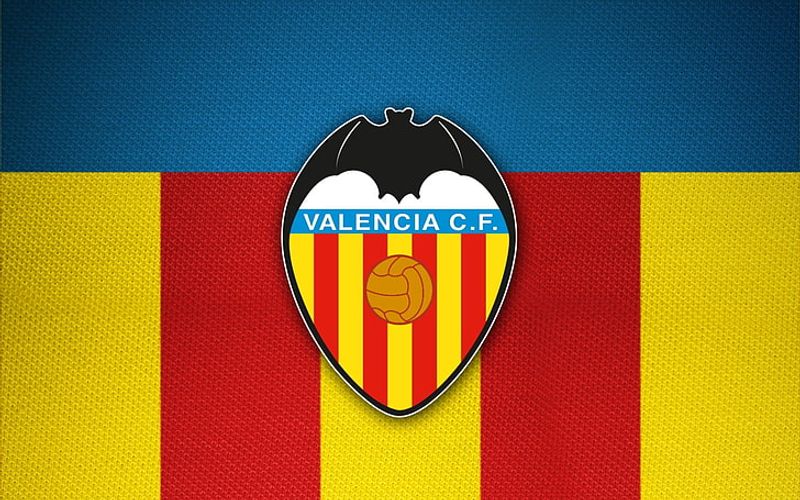
Valencia logo
Achievements
1. Domestic
La Liga
- Winners (6): 1941–42, 1943–44, 1946–47, 1970–71, 2001–02, 2003–04
- Runners-up (6): 1947–48, 1948–49, 1952–53, 1971–72, 1989–90, 1995–96
Segunda Division
- Winners (2): 1930–31, 1986–87
Copa del Rey
- Winners (8): 1941, 1948–49, 1954, 1966–67, 1978–79, 1998–99, 2007–08, 2018–19
- Runners-up (9): 1934, 1944, 1944–45, 1946, 1952, 1969–70, 1970–71, 1971–72, 1994–95
Supercopa de España
- Winners (1): 1999
- Runners-up (3): 2002, 2004, 2008
Copa Eva Duarte (predecessor to the Supercopa de España)
- Winners (1): 1949
- Runners-up (1): 1947
Copa Presidente FEF (es) (predecessor to the Supercopa de España)
- Runners-up (1): 1947
2. European
UEFA Champions League
- Runners-up (2): 1999–2000, 2000–01
European Cup Winners' Cup
- Winners (1): 1979–80
UEFA Cup
- Winners (1): 2003–04
Inter-Cities Fairs Cup
- Winners (2): 1961–62, 1962–63
- Runners-up (1): 1963–64
European Super Cup/UEFA Super Cup
- Winners (2): 1980, 2004
UEFA Intertoto Cup
- Winners (1): 1998
- Runners-up (1): 2005
References
Wikipedia

Related Content

